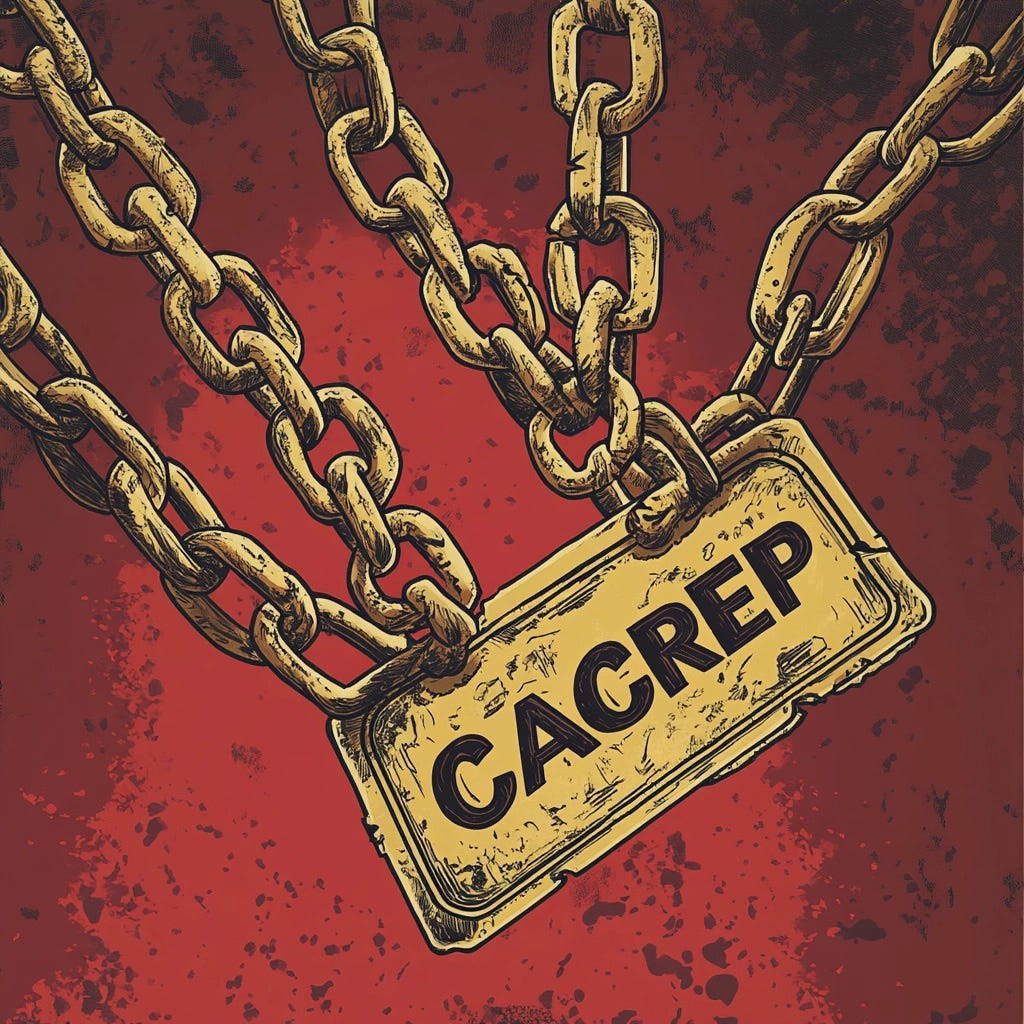Meet the Unelected Body Blocking Mental Health Access Nationwide - Part 2: CACREP's Open Letter
This isn’t just about education—it’s about power, money, and exclusion.
Diogenes In Exile is reader-supported. Keep the lamp of truth burning by becoming a paying subscriber—or toss a few drachmas in the jar with a one-time or recurring donation. Cynics may live in barrels, but websites aren’t free!
This is part 2 of a series. (Go to - Part 1, Part 3, Part 4, Part 5, Part 6)
Meriel had called every counselor in town. Three voicemails, five auto-replies, none were taking new clients. Meanwhile, her son had punched a hole in the wall right next to her head. Last week, he’d called her a manipulative liar. She needed help. She thought a male therapist was her best shot at reaching him, but every name on the list was female, and none of them had called her back. (Names and details have been changed to protect privacy.)
Meriel’s story isn’t rare. Across the country, Americans are caught in a mental health crisis. Waitlists stretch for months. Families spiral. And yet thousands of qualified counselors are locked out of the profession—not because of competence, but because of ideology-driven credentialing barriers. At the heart of it is CACREP: the Council for Accreditation of Counseling and Related Educational Programs.
In 2022 and 2023, CACREP submitted letters urging the Counseling Compact, an interstate agreement that allows practitioners to treat across state lines, to require its rigid, unproven ideology-driven standards—ones even Ivy League schools have rejected, to work under its provisions.
Now that some of these restrictions have been baked into the Compact, that’s leaving talented counselors out and clients waiting for help that may come too late, if at all.
Gatekeeping In the Midst of a Crisis
CACREP is responsible for accrediting 983 programs in 473 institutions, and it holds outsized power over what qualifies as “legitimate” counselor education in the U.S
While other pathways exist, through aggressive lobbying by the American Counseling Association (ACA) and other organizations, a CACREP-accredited degree has become a requirement to work in several states and in U.S. military-related positions.
If CACREP isn’t already a monopoly, its primary competitor is probably Masters in Psychology and Counseling Accreditation Council (MPCAC).
The reason there is some doubt is that despite over 30 years of the ACA and CACREP trying to set ‘professional counseling’ apart, counseling is still routinely confused with other therapy-providing professions, from social workers to clinical psychologists.
So what’s the difference here? MPCAC accredits counseling degrees based in psychology departments, while CACREP strictly accredits counseling programs in the ‘counseling profession’, which it sees as separate..
According to MPCAC, there is some overlap in licensure and professional duties that reflect the origin of the profession. It says:
A critical consideration is that the title of degree or location of training program is not what defines a counselor or mental health service provider; rather it is the competencies acquired and the professional activities pursued.
MPCAC also points out:
State licensing boards have recognized the validity of multiple educational paths toward professional counselor licensure, but are under increasing political pressure to restrict licensure to graduates of CACREP programs.
Among the 66 programs MPCAC accredits are degrees in Clinical Mental Health Counseling, Counseling Psychology, Clinical Counseling Psychology, and Professional Counseling–Mental Heath Emphasis.
So you’d understand why people are confused.
This was the arena in which CACREP was openly lobbying for practitioner participation in the Counseling Compact to be limited to those with an educational background, remarkably similar to CACREP’s standard.
The Open Letter: CACREP’s Push for Exclusivity
In Sept 2023, CACREP released a six-page open letter directed to the ACA’s governing council. It begins citing the ACA Code of Ethics C.3.c. which calls for ensuring that statements made by others about the counseling profession are accurate.
The letter goes on to rehash how CACREP makes their standard, definitely doesn’t lobby–because that’s a political activity, but rather seeks to ‘enlighten’ people. CACREP then complains, that the ACA in its publication, Counseling Today (CT), characterized the organization as ‘relentless’ and ‘demanding,’ for speaking out in open forums and for letters CACREP sent to the Counseling Compact Commission Executive Committee (CCC-EC), and the Compact’s Rules Committee (CCC-RC).
CACREP states that:
If by that, the reference is to CACREP being vocal in public fora about threats to the Counseling profession and the need to be vigilant of unintended consequences, encouraging our constituents to make their voices heard, and writing letters to the CCC-EC and CCC-RC respectively, then yes CACREP has been relentless.
To protest that it also isn’t “demanding,” CACREP spends a page and a half listing the series of demands it sent to the Compact leadership.
The irony is delicious.
In that page an a half of demands, CACREP revealed it thinks the Compact should:
Apply CACREP’s definition of ‘professional counselors’
Adjudicate proper conduct with the ACA Code of Ethics,
Require passage of a national exam, and
Limit the Compact opportunity to counselors who have a 60 semester-hour graduate degree.
Is there evidence to back up these suggestions producing better results for clients? Nope. The ACA Code of Ethics demands adherence to a Social Justice mission and multicultural values, which is then imposed on clients. And Scott Miller’s research on super therapists suggests that coursework or national tests have little to do with therapist performance. Is a graduate degree even necessary much less 60 credit hours? The research doesn’t show it.
This is a turf war, and CACREP seems determined to come out alone.
These demands, presented as ethical obligations, suggest CACREP’s deeper agenda: to lock down professional identity and exclude competitors.
Playing Rugby With People’s Careers
One of CACREP’s key goals is to enshrine a singular identity for the “Professional Counselor.” While it gives lip service to state authority, it writes:
We respect each state’s prerogative to determine how they regulate who practices nominally under the Counseling profession. Our request is that the denotative privilege to practice be granted only to those who are prepared under the standards set by the Counseling profession and identify as Professional Counselors.
It’s then that the open letter references the 2010 report on the group activity between the ACA, the American Association of State Counseling Boards (AASCB), CACREP, and 31 other counseling organizations including the National Board of Certified Counselors (NBCC)--the organization that issues the national counseling certification.
Missing from that meeting: MPCAC and all other groups and people not in line with the ideological and political othodoxy.
It was in these meetings that the idea of what constitutes a Professional Counselor was defined as far as CACREP is concerned.
Among those commitments? The promotion of “multiculturalism” and “social justice” as foundational to the profession—language that still dominates CACREP’s bigoted curriculum standards today.
That’s what CACREP insists be the benchmark of the Counseling Compact today.
The Real-World Consequences
Meriel’s story is just one of thousands. Talented counselors with non-CACREP degrees—many trained in psychology departments, often with superior research backgrounds—are being sidelined. In a profession already under strain, CACREP’s ideological gatekeeping is reducing access, limiting diversity of thought, and worsening a nationwide mental health shortage.
And the stakes may go beyond humanitarian ethics.
The letter CACREP quietly removed from its website after my exposé at Minding the Campus raises deeper questions:
Could CACREP’s coordination with the ACA, the National Board for Certified Counselors (NBCC), American Association of State Counseling Boards (AASCB) and many others, paired with what looks like its attempt to monopolize credentialing, violate federal antitrust law?
Coming Next: CACREP and the Law
In Part 3, we’ll examine how CACREP’s actions could run afoul of the Sherman Antitrust Act. We’ll ask whether this “gold standard” is a legitimate framework—or a market manipulation that harms both professionals and the people they serve.
In the meantime, we’re left with one critical question:
Can America afford CACREP’s gates when mental health is on the line?
This is part 2 of a series. (Go to - Part 1, Part 3, Part 4, Part 5, Part 6)
Further Reading
Accreditation on the Edge: Challenging Quality Assurance in Higher Education by Susan D. Phillips
The Case Against Education by Bryan Caplan
The Licensing Racket: How We Decide Who Is Allowed to Work, and Why It Goes Wrong by Rebecca Haw Allensworth
“Whatever It Is, I’m Against It”: Resistance to Change in Higher Education by Brian Rosenberg
Help Keep This Conversation Going!
Share this post on social media–it costs nothing but helps a lot.
Want more perks? Subscribe to get full access to the article archive.
Become a Paid Subscriber to get video and chatroom access.
Support from readers like you keeps this project alive!
Diogenes in Exile is reader-supported. If you find value in this work, please consider becoming a pledging/paid subscriber, donating to my GiveSendgo, or buying Thought Criminal merch. I’m putting everything on the line to bring this to you because I think it is just that important, but if you can, I need your help to keep this mission alive.
Already a Premium subscriber? Share your thoughts in the chat room.
About
Diogenes in Exile began after I returned to grad school to pursue a Clinical Mental Health Counseling master’s degree at the University of Tennessee. What I encountered, however, was a program deeply entrenched in Critical Theories ideology. During my time there, I experienced significant resistance, particularly for my Buddhist practice, which was labeled as invalidating to other identities. After careful reflection, I chose to leave the program, believing the curriculum being taught would ultimately harm clients and lead to unethical practices in the field.
Since then, I’ve dedicated myself to investigating, writing, and speaking out about the troubling direction of psychology, higher education, and other institutions that seem to have lost their way. When I’m not working on these issues, you’ll find me in the garden, creating art, walking my dog, or guiding my kids toward adulthood.
You can also find my work at Minding the Campus





A friend of mine just published a digital book on 'speech committees', for which I just wrote a positive book review on Amazon:
https://lawyerlisa.substack.com/p/purchase-digital-copy-now-world-on?